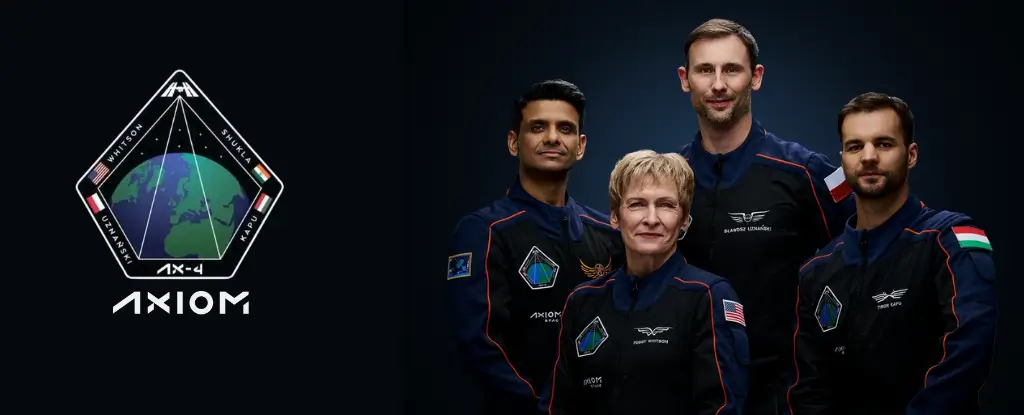When the Grace (C213) Dragon capsule soared through the Florida sky on 25 June 2025 (12:01 PM IST), propelled by SpaceX’s Falcon 9 Block 5 rocket from the Launch Complex 39A at NASA’s Kennedy Space Centre, USA, it was more than just a launch. The long-forgotten dreams of nations were brought back to life once again. For India, Poland, and Hungary, it was the first government-backed human space mission in over four decades and their maiden collaboration aboard the International Space Station (ISS).
The spacecraft docked seamlessly with the ISS’s Harmony module’s Zenith port on 26 June 2025 (4:05 PM IST), ushering in a 20-day, 320-orbit sojourn covering 8.4 million miles, or 13.5 million kilometres. The capsule undocked on 14 July 2025 (4:30 PM IST), and the mission culminated in a smooth Pacific Ocean splashdown near San Diego on 15 July 2025 (3:01 PM IST), closing a historic chapter in space exploration, scientific research, international diplomacy, and human collaboration.
Watch the mission highlights here!
Crew of Four, Four Nations, One Mission
- Peggy Whitson (USA) – Commander and seasoned NASA veteran, holding the record for the most cumulative days in space by an American.
- Group Captain Shubhanshu Shukla (India) – ISRO’s envoy to the cosmos, the first Indian to live and work on the ISS and the nation’s second astronaut since 1984.
- Sławosz Uznański-Wiśniewski (Poland) – European Space Agency project astronaut, reviving Poland’s human spaceflight legacy.
- Tibor Kapu (Hungary) – Representative of the Hungarian Space Office, advancing his nation’s HUNOR programme.

Science Without Borders
Aboard Grace, the crew executed over 60 experiments from 31 countries, a record for any Axiom mission. It included 7 microgravity experiments and 53 scientific experiments for humanity’s benefit. Investigations ranged from the effects of microgravity, human physiology and plant biology to advanced materials research and AI-supported deep-space technologies. Each study pushed the boundaries of knowledge and also strengthened the case for future space missions.
Education and Inspiration
Beyond the laboratories, Ax-4 turned the ISS into a classroom without walls. The astronauts hosted over 20+ educational sessions, connecting with students worldwide and igniting aspirations in the next generation of engineers, scientists, and explorers.
India’s Strategic Leap
ISRO’s participation, valued at over ₹500 crore, was both an investment in technology and a statement of intent. The mission’s findings will feed directly into Gaganyaan, India’s forthcoming indigenous human spaceflight, anticipated later this decade (most probably in the first quarter of 2027). As Shukla reflected upon his return, it was–
“India’s second orbit, proof that we are ready not just to fly, but to lead.”
Significance Beyond the Stars
Delays caused by launch pad anomalies and ISS maintenance extended the crew’s pre-flight quarantine, making it one of the lengthiest in modern space travel. Nevertheless, the outcome reflected the value of perseverance, international collaboration, and global partnerships in shaping humanity’s spacefaring future.
Axiom Mission 4 was not merely a mission to space. It marked the coming together of nations: a triumph of human ingenuity and a promise that the sky is no longer the limit, but only the beginning.
Credits & Sources:
Axiom Space – Axiom Mission 4 Overview & Mission Blog
https://www.axiomspace.com/missions/ax4
NASA – Axiom Mission 4 Crew Dragon Flight Details
https://www.nasa.gov
SpaceX – Falcon 9 & Crew Dragon Mission Updates
ISRO – Indian Human Spaceflight Programme Updates
ISS National Lab – Science Highlights from Axiom Mission 4
https://www.issnationallab.org
Economic Times – Axiom Mission-4: A Success for India and Gaganyaan
https://economictimes.indiatimes.com
Times of India – How Much Did ISRO Spend to Send Shubhanshu Shukla to the ISS?
https://timesofindia.indiatimes.com
India Times – Experiments & Cargo from Shubhanshu Shukla’s ISS Mission
Wikipedia – Axiom Mission 4 (used for factual reference and cross-verification)
